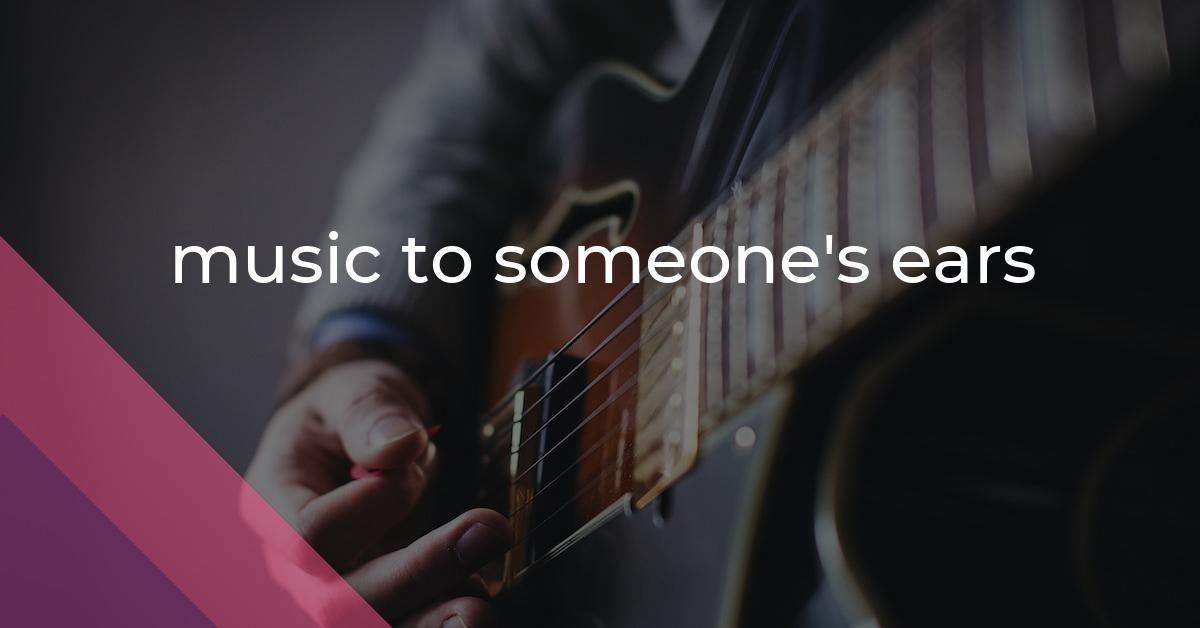music to someone’s ears: Idiom Meaning and Origin
What does ‘music to someone's ears’ mean?
The idiom "music to someone's ears" means that something is pleasing or gratifying to hear.

Idiom Explorer
The idiom "read someone's mind" means to accurately understand or predict someone's thoughts or intentions without them expressing them verbally.
The idiom "read someone's lips" means to carefully watch someone's mouth movements in order to understand what they are saying, especially when it is difficult to hear or understand them.
The idiom "raise someone's spirits" means to make someone feel happier or more optimistic.
The idiom "put someone on to" means to introduce or make someone aware of something, usually a person or an idea.
The idiom "preach to the choir" means to try to convince someone who already agrees with you or is already knowledgeable about a particular topic. It implies that the person you are talking to does not need to be convinced or further educated on the matter.
The idiom "preach to deaf ears" means to give advice or make a speech to someone who is not listening or not receptive to the message.
The idiom "pleasure oneself" refers to engaging in self-gratification or masturbation. It emphasizes the personal satisfaction or pleasure one derives from this act, typically considered taboo or private in most cultures.
The idiom "play to the gallery" means to behave or perform in a way that is intended to gain the favor, support, or applause of the audience or the general public, often without regard for substance or sincerity.
The idiom "pickin' and grinnin'" refers to the act of playing music, usually on a stringed instrument, and smiling or grinning while doing so. It is often used to describe a casual or enjoyable musical performance.
Melodic Bliss
One of the commonly used idioms in the English language is "music to someone's ears." This idiom is often used to convey a sense of delight or pleasure in response to hearing something positive or favorable.
The phrase "music to someone's ears" implies that the information or news being conveyed is highly pleasing or gratifying to the individual. It suggests that the positive emotions generated by the message being received are equivalent to the joy and happiness associated with the sound of music.
Given its prevalence in everyday conversation and writing, it is difficult to pinpoint the exact origin of this idiom. However, it is likely derived from the universally recognized association of music with pleasure and emotional resonance.
This idiom can be used in a variety of contexts. Whether it's receiving praise for a job well done, hearing about a promotion, or learning of a positive outcome, the phrase "music to someone's ears" effectively captures the joy and satisfaction experienced by the listener.
Additionally, the idiom "music to someone's ears" serves as a reminder of the universal human desire for validation and positive affirmation. It reflects our innate inclination towards seeking happiness and finding solace in positive experiences.
The idiom "music to someone's ears" expresses the profound delight and satisfaction experienced upon hearing positive news or information. It draws upon the universally recognized association of music with happiness and emotional resonance to convey the depth of pleasure felt by the listener.
A related idiom is "make someone's ears sad." This idiom is used to describe the opposite effect of "music to someone's ears." Instead of bringing joy and pleasure, the information or news being received is highly disappointing or disheartening. Just as music can uplift and bring happiness, certain words or news can have the opposite effect and make someone feel sad or upset.
Another related idiom is "make someone's day." This idiom is used to describe a situation where something happens that brings great happiness or joy to an individual. It can be as simple as a kind gesture or a positive event. In the context of "music to someone's ears," if the news or information received is incredibly positive and brings immense joy, it can be said to make someone's day.
The final related idiom is "mind's ear." This idiom refers to the ability to imagine or hear music or sounds in one's mind. When we say that something is "music to someone's ears," we are referring to the emotional impact and satisfaction experienced upon hearing positive information or news. In a way, the idiom "music to someone's ears" taps into the individual's ability to create positive emotions and feelings, just like how the "mind's ear" allows us to imagine and hear music in our minds.
Example usage
Examples of how the idiom "music to someone's ears" can be used in a sentence:
- When the doctor told her she was completely healthy, it was music to her ears.
- After months of hard work, getting a promotion was like music to his ears.
- The sound of rain tapping on the roof was always music to her ears.
More "Music" idioms



